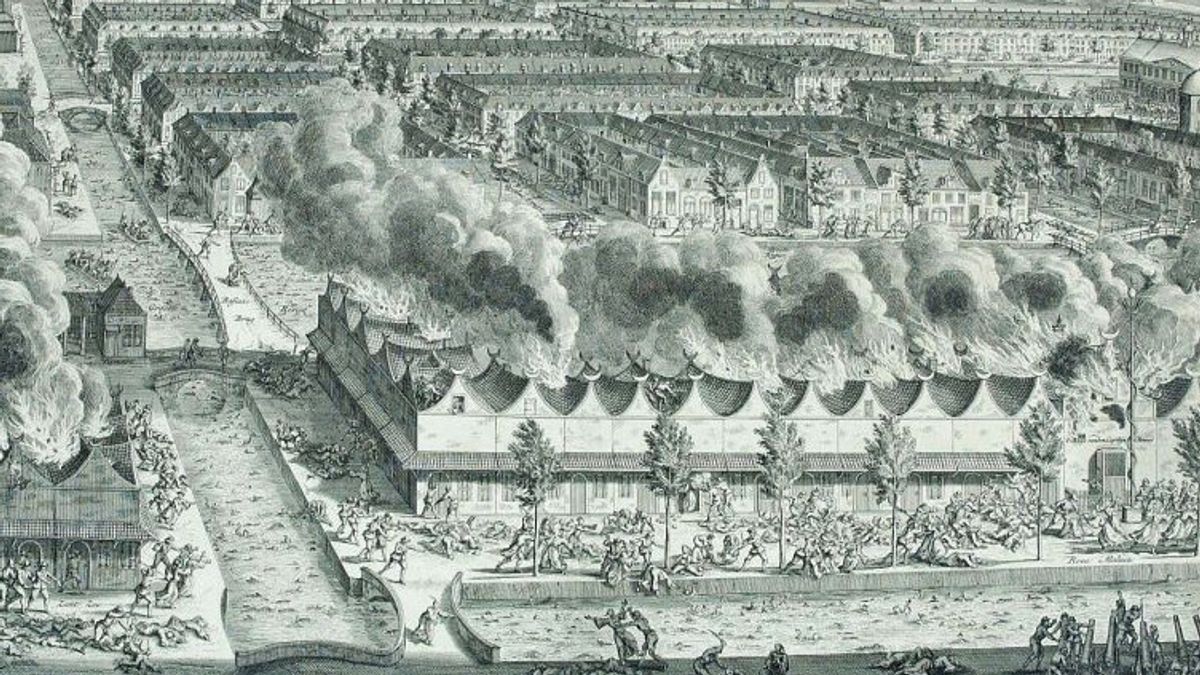JAKARTA - The closeness of the Dutch trading airline, the VOC to ethnic Chinese is second to none. The relationship between the two is able to generate the symbiosis of mutualism. The Dutch are profitable, and vice versa. However, no one dared to guarantee that the relationship lasts forever.
When the VOC started to lose money in 1740, for example. The presence of Chinese people is starting to be considered a burden. Chinese activities are limited because they often cause trouble. Whoever is caught, they will be subject to strict sanctions. The spread of assets was perpetuated by the VOC.
The Company never imagined how it would be to build a colony without Chinese people. the Japanese's inability, especially the Dutch, adapts to the tropical climate, so it's the estuary. This fact makes all kinds of affairs in Batavia (now: Jakarta) done by the Chinese. From builders to traders.
The Chinese are also the driving force of the economy in Batavia. Everything because of the presence of the Chinese people has received the blessing of Jan Pieterszoon Coen. The Governor-General of the VOC who served twice (1619-1623 and 1627-1629) made the Chinese a special citizen.
Batavia's door is always open to the Chinese. In fact, Coen did not tolerate the Dutch who humiliated the Chinese. The privilege that was given to the Chinese continued to survive as long as the Company made a big profit.
Things were different when the Company started to lose money. The loss of the VOC who lost to the British trading airline, EIC in 1740, for example. The loss made economic activity in Batavia sluggish. Mainly, the Chinese business.
Factories stop operating and unemployment everywhere. This condition is exacerbated by the arrival of immigrants from China. As a result, their arrival actually adds to the difficulty. The absence of work is a cause.
Many of them also took shortcuts by perpetuating the robbery as an effort to earn income. The issue also developed. The Chinese not only caused trouble, but also wanted to rebel against the Company.
In 1740 other stories began to circulate, that the Chinese plan to rebel and intend to conquer Batavia suddenly. It's a bit surprising that the Chinese will plan it, because they have always been the favorite people of the Batavian government because of their crafts, peace, and calm behavior. But in recent years, a large number of Chinese poor immigrants have arrived in Batavia and after that they cannot get a job."
The government limits the number of immigrants and regulates the quota system, but this law continues to be violated by Chinese people who know the weak point of the Company's government system, namely the small salary of their employees. So, too many came. and those who fail to get halal work start looting rural areas around the capital," said Bernard HM Vlekke in the book Nusantara (2008).
Kompeni was furious with the behavior of the Chinese people who often caused trouble, the culprit of the robbery. The Governor General of the VOC, Adriaan Valckenier took a stand. He asked a series of the Indies Council to provide steps that Kompeni needed to take. Resolution July 25, 1740 was born.
The resolution contained the rules for the arrest of Chinese people who were deemed suspicious. Of those who already have residence permits to those who are not licensed. They will be punished if proven to have committed trouble.
The resolution also regulates Chinese people who may be in Batavia. Even if it is limited to those who only have jobs. Those who do not have jobs will soon be arrested. However, the implementation of the regulation is full of fraud.
Compeni officials who only think about profit become a cause. Instead of just arresting Chinese people, the VOC actually contributes to the confiscation of assets owned by Chinese people. From money, home, to land.
The asset trade made the Chinese in Batavia panic. Moreover, the effort was supported by rumors that the Company did not throw the Chinese into Sri Lanka, but they were drowned in the middle of the ocean.
The anger also filled all Chinese in Batavia. They staged an uprising against the VOC on October 9, 1740. However, the VOC took over the situation. They suppressed the rebellion by perpetuating the massacre of 10 thousand Chinese in Batavia. The incident was later remembered as Geger Pacinan.
The VOC took advantage of the opportunity to check residence permits by taking arbitrary actions, such as frequent confiscation of property and mistreatment of the Chinese ethnicity and their families. During the arrest there was an irregularity, in which those who were detained were not only unemployed, or homeless but also good and rich people were also arrested by force and violence.
The main goal is to extort some money for personal gain. Therefore, all Chinese citizens, whether they already have residence permits or not, all of them live in panic. As a result, many ethnic Chinese people leave their homes and combine themselves with other Chinese herd," explained Hembing Wijayakusuma in the book Mass Slaughter 1740: Angke Bloody Tragedy (2005).
The English, Chinese, Japanese, Arabic, and French versions are automatically generated by the AI. So there may still be inaccuracies in translating, please always see Indonesian as our main language. (system supported by DigitalSiber.id)









